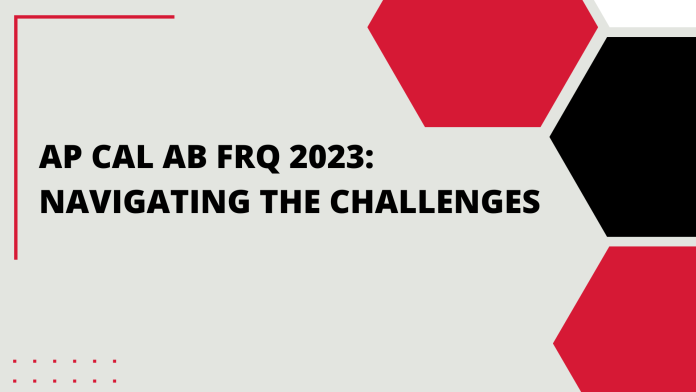As students embark on their Advanced Placement AP Calc AB FRQ 2023 journey, the Free Response Questions (FRQs) stand as a crucial aspect of the examination. Understanding the format, preparing effectively, and staying updated on any changes are paramount for success.
Understanding AP Calc AB FRQs
Format and Structure
The FRQ section is a critical component of the AP Calc AB exam. It typically consists of a set of open-ended questions that assess students’ understanding of calculus concepts.
Common Types of Questions
Students can expect a variety of questions, including those related to differential and integral calculus, as well as questions that require the application of concepts to real-world scenarios.
Weightage in the Exam
The FRQs contribute a significant portion of the overall exam score. Acknowledging their importance is the first step toward effective preparation.
Preparation Strategies
Grasping Key Concepts
A solid foundation in calculus principles is essential. Focus on mastering fundamental concepts such as limits, derivatives, and integrals.
Time Management Tips
Developing effective time management skills is crucial. Allocate time for each question during practice to simulate exam conditions.
Practicing with Past FRQs
Utilize past FRQs to familiarize yourself with the question formats. This not only builds confidence but also highlights areas that may require additional attention.
Notable Changes in 2023
Exam Modifications
Stay informed about any changes to the AP Calc AB exam format or content. The College Board occasionally updates its requirements.
Implications for Students
Understanding the implications of these changes is vital. It ensures that students align their preparation with the current exam structure.
Resources for Staying Updated
Explore reputable resources to stay informed. Websites, official announcements, and educator forums are valuable tools for remaining up-to-date.
Tips from Top Scorers
Personal Experiences
Learn from the experiences of students who excelled in the AP Calc AB exam. Their insights can provide valuable strategies for success.
Study Techniques
Top scorers often employ unique study techniques. Experiment with different methods to discover what works best for you.
Overcoming Challenges
Every student faces challenges. Understanding how high-achievers overcame obstacles can inspire resilience and perseverance.
Expert Advice
Insights from AP Calc AB Educators
Educators offer valuable insights into effective study strategies. Attend review sessions and seek guidance from experienced teachers.
Recommended Study Materials
Discover recommended study materials that align with the AP Calc AB curriculum. High-quality resources enhance understanding.
Addressing Common Misconceptions
Clearing up common misconceptions about certain calculus topics is crucial for a comprehensive understanding.
Importance of Mock Exams
Simulating Exam Conditions
Mock exams replicate the pressure of the actual test. Engage in timed, full-length practice exams to enhance your readiness.
Identifying Weak Areas
Analyzing mock exam results helps identify weak areas. Targeted improvement in these areas can significantly boost overall performance.
Building Confidence
Regularly engaging in mock exams builds confidence. Familiarity with the exam format reduces anxiety on the test day.
Navigating Online Resources
Websites and Forums
Explore online platforms dedicated to AP Calc AB. Participate in forums, ask questions, and share insights with other students.
Interactive Study Tools
Interactive tools enhance learning. Utilize online platforms that offer quizzes, flashcards, and interactive lessons.
Online Communities for Support
Join online communities where students discuss challenges and share tips. Peer support can be invaluable during the preparation process.
Balancing Review and Practice
Allocating Study Time Effectively
Divide study time between reviewing theory and practicing problem-solving. Striking a balance is essential for comprehensive preparation.
Balancing Theory and Application
Understanding theory is crucial, but application is equally important. Aim for a holistic understanding of calculus concepts.
Maintaining a Positive Mindset
A positive mindset contributes to effective learning. Embrace challenges as opportunities for growth and improvement.
Real-world Applications of AP Calc AB
Examples of Calculus in Everyday Life
Explore real-world applications of calculus, from economics to physics. Understanding the practical implications can foster a deeper appreciation for the subject.
Inspiring a Passion for the Subject
Connecting calculus to real-world scenarios can inspire a passion for the subject. Embracing its relevance makes the learning journey more enjoyable.
Future Career Implications
Acknowledge the role of AP Calc AB in future academic and career pursuits. Many STEM fields value a strong foundation in calculus.
Overcoming Exam Anxiety
Practical Tips for Managing Stress
Develop practical strategies for managing exam-related stress. This includes mindfulness techniques and effective stress-reducing activities.
Building a Pre-exam Routine
Establish a pre-exam routine to ease nerves. Familiar activities can create a sense of comfort and readiness.
The Role of Mindset in Success
A positive mindset directly impacts performance. Believe in your preparation and approach the exam with confidence.
Post-Exam Strategies
Reflecting on Performance
After the exam, take time to reflect on your performance. Identify strengths and areas for improvement to guide future study sessions.
Addressing Areas for Improvement
Implement targeted strategies to address identified weaknesses. Continuous improvement is a key aspect of academic success.
Celebrating Achievements
Acknowledge your efforts and achievements. Celebrating small victories boosts motivation for ongoing preparation.
Frequently Asked Questions (FAQs)
How many FRQs are there in the AP Calc AB exam?
The AP Calc AB exam typically includes six FRQs.
Can I use a calculator during the FRQ section?
Yes, a calculator is allowed during the FRQ section of the exam.
How are FRQs scored?
FRQs are scored based on the correctness and completeness of the responses. Partial credit may be awarded for demonstrating understanding.
Is it better to focus on theory or practice for the exam?
A balanced approach is ideal. Understanding theory is crucial, but regular practice is essential for success.
What are the most challenging topics in AP Calc AB?
Challenges vary among students, but common areas include related rates, optimization, and integration techniques.
Conclusion
In navigating the landscape of AP Calculus AB FRQs, a strategic and comprehensive approach is key. Understand the format, leverage effective preparation strategies, and draw inspiration from the experiences of top scorers. Remember, success in AP Calc AB is not just about the exam—it’s about cultivating a lasting appreciation for the beauty and utility of calculus.

